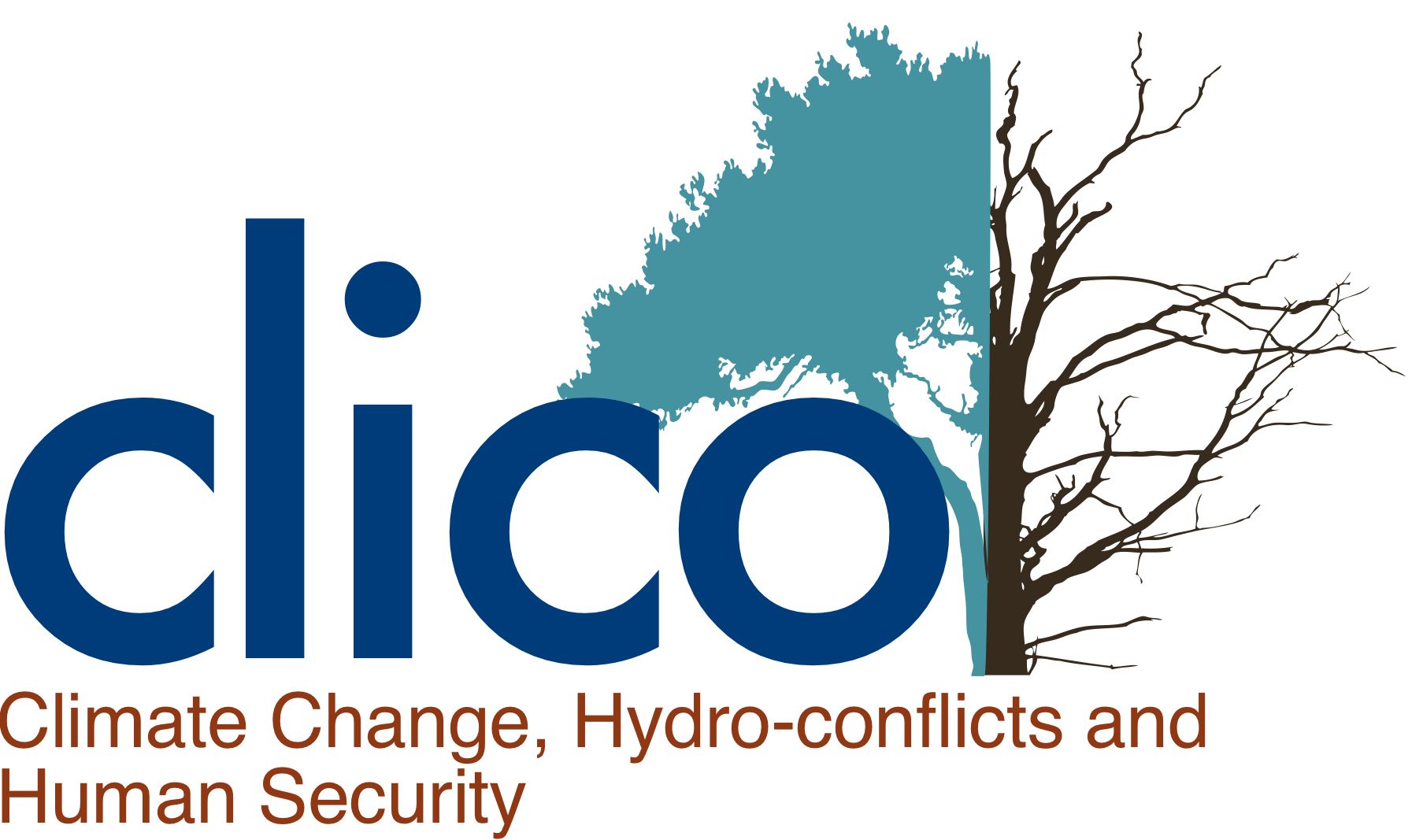Climate change poses several threats to human security. Hydro-climatic hazards such as droughts and floods have the potential to trigger or exacerbate social tensions, intra- and inter-state conflict. The EU-funded project CLICO will examine the relationships between hydro-climatic hazards, human security and conflict. The project will also develop recommendations for the best types of policies and institutions to avoid or better prepare for water conflicts related to climate change.
Background
Potential links between climate change impacts and violent conflict have received wide public attention. International resolutions such as the Rio Declaration on Environment and Development, the European Security Strategy, and the UN High Level Panel on Threats, Challenges, and Change address these potential links between climate change and violent conflict. However, the alleged causal relationship between water shortages and violent conflict is as a general rule based on single case studies and have not been confirmed by large comparative studies. The vulnerability, capacity to adapt and resilience of different regions and communities to climate change differs greatly, and so may the propensity for violent conflict.
CLICO aims at filling the gap in knowledge over the social dimensions of climate change, by looking whether hydro-climatic hazards intensify social tensions and conflicts or whether they provide a catalyst for cooperation and peace. The project concentrates on the Mediterranean, Middle East and Sahel (MMES), which are among the regions in the world most exposed and vulnerable to droughts and floods.
Main objectives
In this context, CLICO pursues the following objectives:
- To understand and model the relationships between hydro-climatic hazards, climate change vulnerability, human security and conflict, on the basis of theoretically-informed, comparative empirical research.
- To map international and national policies for security and adaptation in water resources and hazard management, and develop a policy model for security against hydro-climatic hazards (“hydro-security”) in the MMES region, applicable to the UN, EU and national states.
Ecologic in CLICO
Ecologic leads the analysis of international, national and regional policies for dealing with hydro-climatic hazards and adaptation with a view to security (WP4). A suitable model will be framed into a set of guidelines for mainstreaming hydro-security issues into policy.
Ecologic will contribute recommendations for improving the relevant institutional and policy capacity to the final synthesis report “Regional Assessment and Policy Guidelines” (WP6). Annual policy briefs will be used to communicate research results to policy-makers (WP7).
More information on CLICO can be found on the CLICO website.
- Funding
-
European Commission, Directorate-General Research & Innovation (DG Research & Innovation), International - Partner
-
Universitat Autònoma de Barcelona (UAB), Spain University of East Anglia, Tyndall Centre for Climate Change Research, United Kingdom Swiss Federal Institute of Technology Zurich (ETH), Switzerland The Cyprus Institute (CYI), Cyprus United Nations University, Institute for Environment and Human Security (UNU-EHS), International Peace Research Institute Oslo, Centre for the Study of Civil War (CSCW), Norway Hebrew University of Jerusalem (HUJI), Israel Suez Canal University, Egypt Swiss Federal Institute of Technology Zurich, Centre for Comparative and International Studies (CIS), Switzerland University of Sussex, School of Global Studies, United Kingdom Centre for Ecological Research and Forestry Applications (CREAF), Spain Addis Ababa University, Department of Political Science & International Relations (DPSIR), Ethiopia Ecologic Institute, Germany - Team
-
Dr. Christiane GerstetterMaria BerglundHaran Bar-OnElizabeth Tedsen JD
- Duration
-
-
- Project ID
- Keywords
-
water, droughts, floods, climate change, conflict, security, adaptation, institutionsMediterranean, Middle East, Sahel, South Europe, Mediterranean, Middle East, Sahel, global
Kloos, J., Gebert, N., Rosenfeld, T., and F. Renaud (2013). Climate Change, Water Conflicts and Human Security: Regional Assessment and Policy Guidelines for the Mediterranean, Middle East and Sahel. Report No. 10. Bonn: United Nations University Institute for Environment and Human Security (UNU-EHS).
Gerstetter, Christiane et al. 2012: The effectiveness of policy frameworks for addressing climate-induced risks to human security and conflict - Report on stakeholder perspectives and demands. Ecologic Institute, Berlin.
Christiane Gerstetter, Katriona McGlade 2012: Climate change, water conflicts and human security in the Mediterranean, Middle East and Sahel - Findings and recommendations from the CLICO FP7 SSH research project (www.clico.org). Berlin: Ecologic Institute.
Gerstetter, Christiane et al. 2012: The effectiveness of policy frameworks for addressing climate-induced risks to human security and conflict – Report on stakeholder perspectives and demands (short version). Ecologic Institute, Berlin.
Vidaurre, Rodrigo and Elizabeth Tedsen 2012: Effectiveness of current policy frameworks in mitigating climate-induced risks relating to human security and conflict – case study on Ethiopia. Ecologic Institute, Berlin.
Bar-On, Haran and Christiane Gerstetter 2012: Effectiveness of current policy frameworks in mitigating climate-induced risks relating to human security and conflict - case study on Israel and the occupied Palestinian Territories. Ecologic Institute, Berlin.
McGlade, Katriona and Isabelle Turcotte 2012: Effectiveness of current policy frameworks in mitigating climate-induced risks relating to human security and conflict - case study on Morocco. Ecologic Institute, Berlin.
McGlade, Katriona and Elizabeth Tedsen 2012: Effectiveness of current policy frameworks in mitigating climate-induced risks relating to human security and conflict - case study on the United Nations. Ecologic Institute, Berlin.
McGlade, Katriona and Elizabeth Tedsen 2012: Effectiveness of current policy frameworks in mitigating climate-induced risks relating to human security and conflict - case study on the EU. Ecologic Institute, Berlin.
Gerstetter, Christiane and Rodrigo Vidaurre 2012: Will States See More Water Conflicts as the Climate Changes? - CLICO Policy Brief No. 3. Berlin: Ecologic Institute.
Speech:Events on Climate Change, Conflict and Human Security during Durban Climate Summit
- Date
-
- Location
- Durban, South Africa
Gerstetter, Christiane et al. 2011: Review of policies on climate change, water conflicts and human security. Ecologic Institute, Berlin.
Speech:Policies that address the interface between climate change, water conflicts and human security
- Date
-
- Location
- Addis Ababa, Ethiopia
Speech:Do hydro-climatic hazards intensify social tensions and conflicts?
- Date
-
- Location
- Marseille, France
Dinner Dialogue:Environmental Change, Human Insecurity and Earth System Science
- Date
-
- Location
- Berlin, Germany
Panel discussion:Public panel discussion: Climate Change, Human Security, and Conflict in Africa
- Date
-
- Location
- Berlin, Germany
Speech:Climate Change and Hydro-conflicts – the Research Project CLICO
- Date
-
- Location
- Berlin, Germany
Speech:Climate Change and Hydro-conflicts – the Research Project CLICO
- Date
-
- Location
- Dresden, Germany















